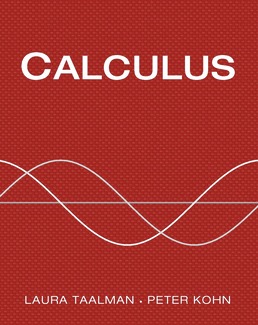
GET FREE SHIPPING!
Use Promo Code SHIPFREE at Step 4 of checkout.
*Free Shipping only applicable to US orders. Restrictions apply.
Calculus Combo
First Edition©2014 Laura Taalman; Peter Kohn
ISBN:9781464151088
Read and study old-school with our bound texts.
Many calculus textbooks look to engage students with margin notes, anecdotes, and other devices. But many instructors find these distracting, preferring to captivate their science and engineering students with the beauty of the calculus itself. Taalman and Kohn’s refreshing new textbook is designed to help instructors do just that.
Taalman and Kohn’s Calculus offers a streamlined, structured exposition of calculus that combines the clarity of classic textbooks with a modern perspective on concepts, skills, applications, and theory. Its sleek, uncluttered design eliminates sidebars, historical biographies, and asides to keep students focused on what’s most important—the foundational concepts of calculus that are so important to their future academic and professional careers.
Purchasing WebAssign? Choose the right option for your course!
ISBN 9781319063481 includes Homework only for 6-months access.
ISBN 9781319063429 includes Homework and the e-textbook for 6-months access.
ISBN 9781319063351 includes Homework and the e-textbook for life of edition access.
Table of Contents
Part I. Differential Calculus
0. Functions and Precalculus
0.1 Functions and Graphs
0.2 Operations, Transformations, and Inverses
0.3 Algebraic Functions
0.4 Exponential and Trigonometric Functions
0.5 Logic and Mathematical Thinking*
Chapter Review, Self-Test, and Capstones
1. Limits
1.1 An Intuitive Introduction to Limits
1.2 Formal Definition of Limit
1.3 Delta-Epsilon Proofs*
1.4 Continuity and Its Consequences
1.5 Limit Rules and Calculating Basic Limits
1.6 Infinite Limits and Indeterminate Forms
Chapter Review, Self-Test, and Capstones
2. Derivatives
2.1 An Intuitive Introduction to Derivatives
2.2 Formal Definition of the Derivative
2.3 Rules for Calculating Basic Derivatives
2.4 The Chain Rule and Implicit Differentiation
2.5 Derivatives of Exponential and Logarithmic Functions
2.6 Derivatives of Trigonometric and Hyperbolic Functions*
Chapter Review, Self-Test, and Capstones
3. Applications of the Derivative
3.1 The Mean Value Theorem
3.2 The First Derivative and Curve Sketching
3.3 The Second Derivative and Curve Sketching
3.4 Optimization
3.5 Related Rates
3.6 L’Hopital’s Rule
Chapter Review, Self-Test, and Capstones
Part II. Integral Calculus
4. Definite Integrals
4.1 Addition and Accumulation
4.2 Riemann Sums
4.3 Definite Integrals
4.4 Indefinite Integrals
4.5 The Fundamental Theorem of Calculus
4.6 Areas and Average Values
4.7 Functions Defined by Integrals
Chapter Review, Self-Test, and Capstones
5. Techniques of Integration
5.1 Integration by Substitution
5.2 Integration by Parts
5.3 Partial Fractions and Other Algebraic Techniques
5.4 Trigonometric Integrals
5.5 Trigonometric Substitution
5.6 Improper Integrals
5.7 Numerical Integration*
Chapter Review, Self-Test, and Capstones
6. Applications of Integration
6.1 Volumes By Slicing
6.2 Volumes By Shells
6.3 Arc Length and Surface Area
6.4 Real-World Applications of Integration
6.5 Differential Equations*
Chapter Review, Self-Test, and Capstones
Part III. Sequences and Series
7. Sequences and Series
7.1 Sequences
7.2 Limits of Sequence
7.3 Series
7.4 Introduction to Convergence Tests
7.5 Comparison Tests
7.6 The Ratio and Root Tests
7.7 Alternating Series
Chapter Review, Self-Test, and Capstones
8. Power Series
8.1 Power Series
8.2 Maclaurin Series and Taylor Series
8.3 Convergence of Power Series
8.4 Differentiating and Integrating Power Series
Chapter Review, Self-Test, and Capstones
Part IV. Vector Calculus
9. Parametric Equations, Polar Coordinates, and Conic Sections
9.1 Parametric Equations
9.2 Polar Coordinates
9.3 Graphing Polar Equations
9.4 Computing Arc Length and Area with Polar Functions
9.5 Conic Sections*
Chapter Review, Self-Test, and Capstones
10. Vectors
10.1 Cartesian Coordinates
10.2 Vectors
10.3 Dot Product
10.4 Cross Product
10.5 Lines in Three-Dimensional Space
10.6 Planes
Chapter Review, Self-Test, and Capstones
11. Vector Functions
11.1 Vector-Valued Functions
11.2 The Calculus of Vector Functions
11.3 Unit Tangent and Unit Normal Vectors
11.4 Arc Length Parametrizations and Curvature
11.5 Motion
Chapter Review, Self-Test, and Capstones
Part V. Multivariable Calculus
12. Multivariable Functions
12.1 Functions of Two and Three Variables
12.2 Open Sets, Closed Sets, Limits, and Continuity
12.3 Partial Derivatives
12.4 Directional Derivatives and Differentiability
12.5 The Chain Rule and the Gradient
12.6 Extreme Values
12.7 Lagrange Multipliers
Chapter Review, Self-Test, and Capstones
13. Double and Triple Integrals
13.1 Double Integrals over Rectangular Regions
13.2 Double Integrals over General Regions
13.3 Double Integrals in Polar Coordinates
13.4 Applications of Double Integrals
13.5 Triple Integrals
13.6 Integration with Cylindrical and Spherical Coordinates
13.7 Jacobians and Change of Variables
Chapter Review, Self-Test, and Capstones
14. Vector Analysis
14.1 Vector Fields
14.2 Line Integrals
14.3 Surfaces and Surface Integrals
14.4 Green’s Theorem
14.5 Stokes’ Theorem
14.6 The Divergence Theorem
Chapter Review, Self-Test, and Capstones
 Canada
Canada


